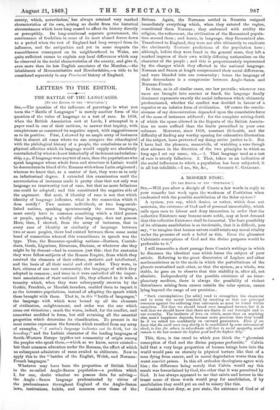LETTERS TO THE EDITOR.
THE BATTLE OF THE LANGUAGES.
[TO THE EDITOR OF THE " SPECTITOR.1
SIR,—The question of the influence of parentage in what you term the " Battle of Languages " is merely another form of the question of the value of language as a test of race. In 1858, when the British Association met at Leeds, I attempted in a paper read in one of their sections, to answer that inquiry, with completeness as concerned its negative aspect, with suggestiveness as to its positive. First, I showed by an ample array of instances that in almost all cases where we can compare the ethnological with the philological history of a people, the conclusions as to its physical affinities which its language would supply are absolutely contradicted by what we know historically of its descent and relation- ship, e.g., if language were anytest of race, then the populations who speak languages whose whole form and structure is Latinic would be descendants in blood of the Romans with whom Latin originated ; whereas we know that, as a matter of fact, they were so in only an infinitesimal degree. I extended this examination until the accumulation of instances made it pretty clear that not only was language no trustworthy test of race, but that no more fallacious one could be adopted ; and this constituted the negative side of the argument. But next, if identity of race is not that which identity of language indicates, what is the connection which it does certify? Two mature individuals, or two long-estab- lished nations, speaking spontaneously the same language, must surely have in common something which a third person or people, speaking a wholly alien language, does not possess. Here, then, I showed, from the array of instances, that in every case of identity or similarity of language between two or more peoples, there had existed between them some social bond of connection whereof this resemblance in speech was the type. Thus, the Romance-speaking nations—Iberians, Cantab- rians, Gauls, Ligurians, Etruscans, Dacians, or whatever else they might be by descent—had in common just this : that for centuries they were fellow-subjects of the Roman Empire, from which they received the elements of their culture, aesthetic and intellectual, and the basis of all their social and civil order. They were, in fact, citizens of one vast community, the language of which they adopted in common ; and since in it were embodied all the impor- tant associations of their national life, they adhered to it with a tenacity which, when they were subsequently overrun by the Gothic, Frankish, or Moorish invaders, enabled them to impart it to the intrusive populations, instead of adopting the speech which these brought with them. That is, in this " battle of languages," the language with which were bound up all the elements of civilization, enlightenment, and order was the one which came out victorious ; much the worse, indeed, for the conflict, and somewhat modified in form, but still retaining all the essential properties which determine its classification. To present in its most concise expression the formula which resulted from my array of examples, " A nation's language indicates not its birth, but its breeding ;" and the Latinic character of the leading languages of South-Western Europe typifies not community of origin among the peoples who speak them,—which as we know, never existed— but their common education under the Romans, the effect of which no subsequent admixture of races availed to obliterate. Now to apply this to the " battles of the English, Welsh, and Norman- French languages."
Whatever may have been the proportion of British blood in the so-called Anglo-Saxon population—a problem which I, for one, doubt whether we possess data for solving— the Anglo - Saxon language predominated by virtue of the predominance throughout England of the Anglo-Saxon laws, institutions, habits, and manners over those of the Britons. Again, the Normans settled in Neustria resigned immediately everything which, when they entered the region, constituted them Norman ; they embraced with avidity the religion, the refinement, the civilization of the Romanized popula- tion around them ; and hence, in language, they Romanized also. Transferred to England, they were not able ultimately to eradicate the obstinately Teutonic predictions of the population here ; although, before they were fused in the general mass, they left a marked impress of their own widely differing nationalism on the character of the people ; and this is proportionately represented by the changes which they effected in the national language. Norman and Saxon at length compromised their social differences, and were blended into one community ; hence the language of their descendants is a compromise between Anglo-Saxon and Norman-French.
In these, as in all similar cases, one law prevails ; wherever two races are brought into contact or fused, the language finally dominant represents exactly the social influences which ultimately predominated, whether the conflict was decided in favour of a- superior or an inferior form of civilization. Of course the conclu- siveness of my demonstration depended upon the cumulative force of the mass of instances adduced ; for the complete setting-forth of which the space allowed in the Reports of the British Associa- tion no more sufficed than the limits prescribed in your own columns. Moreover, since 1858, constant ill-health, and the difficulty of finding any worthy opening for exhaustive illustration of the subject, have prevented my doing entire justice to it. But I have had the pleasure, meanwhile, of watching a sure though slow advance in the direction of the two principles to which so long ago I set my name, viz.,-1. That language used as a test of race is utterly fallacious. 2. That, taken as an indication of the social influences to which a population has been subjected, it
is all but infallible.—I sin, Sir, &c., GEORGE C. GELDART.






























 Previous page
Previous page